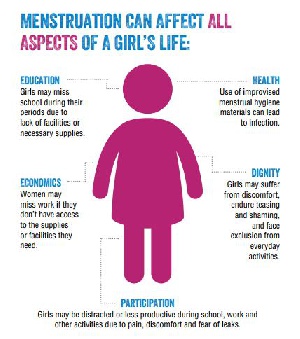 A photo portraying menstrual hygiene management
A photo portraying menstrual hygiene management
A five-year strategic plan to promote effective menstrual hygiene management (MHM)in the country’s schools has been launched in Accra.
According to the Ghana Education Service (GES), the guidelines are intended to create greater awareness of menstrual hygiene and support girls to better manage their menses hygienically and in a dignified manner.
It will also guide stakeholders at all levels to implement actions for the MHM programme and promote a conducive environment for improved water, sanitation and hygiene (WASH) infrastructure and services to help keep girls in schools during their menses.
In partnership with UNICEF, KOICA and the Canadian government with support from the Ministries of Education, Gender, Children and Social Protection as well as Sanitation and Water Resourced, the GES launched the plan and its guidelines to mark this year’s World Menstrual Hygiene Day (WMHD).
Marked on May 28 every year, the day advocates action by governments, non-profit organisations, private sector players and individuals to promote good menstrual health and hygiene for women and girls across the globe.
This year’s commemoration was on the theme ‘More action and investment in menstrual health and hygiene’.
In a speech read on his behalf, Education Minister, Dr. Yaw Osei Adutwum, expressed his Ministry’s commitment to promote MHM in schools across the country by providing the necessary menstrual hygiene products and infrastructure.
He rallied the support of all relevant stakeholders to improve MHM in the country to keep girls in school and “leave no one behind”.
That, he noted, was critical to accelerate the country’s efforts in achieving Sustainable Development Goal (SDG) four, which seeks to ensure inclusive and equitable education for all.
“It will also help us achieve targets under SDG five on gender equality and six on availability and sustainable management of water and sanitation,” he said.
The Minister of Gender, Children and Social Protection (MOGCSP), Sarah Adwoa Safo, in a remark, said efforts were far advanced to scrap taxes on sanitary pads to make them affordable for girls and women in a bid to promote MHM in the country.
She said it was her hope that through increased advocacy on MHM, negative perceptions and myths around menstruation, would be a thing of the past.
“We need everyone to understand that menstruation is normal for every girl and that it is not a taboo or sickness so that they can receive enough support during that period,” she said.
Country Director of UNICEF Ghana, Anne Claire Dufay, urged the government to prioritise investment in toilet facilities for every school across the country while mainstreaming MHM and adolescent reproductive health issues in the school curriculum to provide equal access to information for both boys and girls.
“We need to invest in every adolescent girl’s future with more gender-friendly sanitation facilities in schools, adequate nutrition and information for girls and boys so that we do not leave anyone behind.
“UNICEF invites the government and the private sector to substantially reduce the prices of sanitary pads and other materials for girls and women whether they are produced locally or imported,” she said.